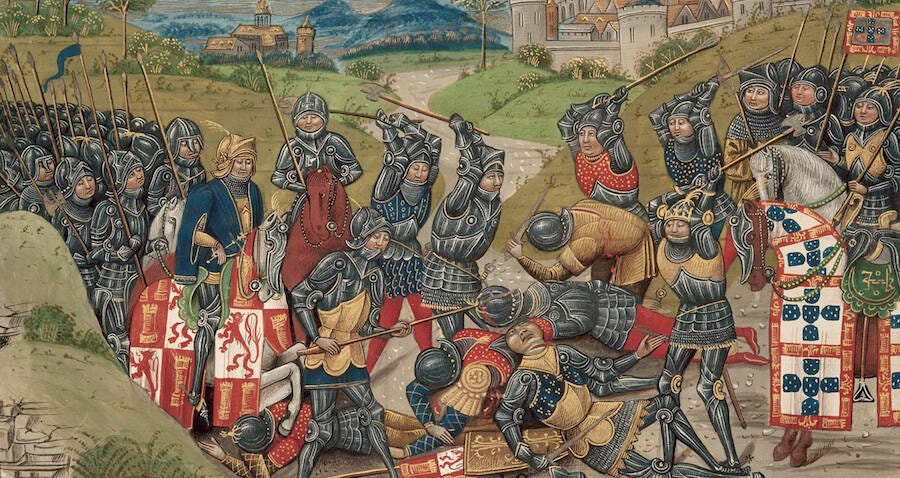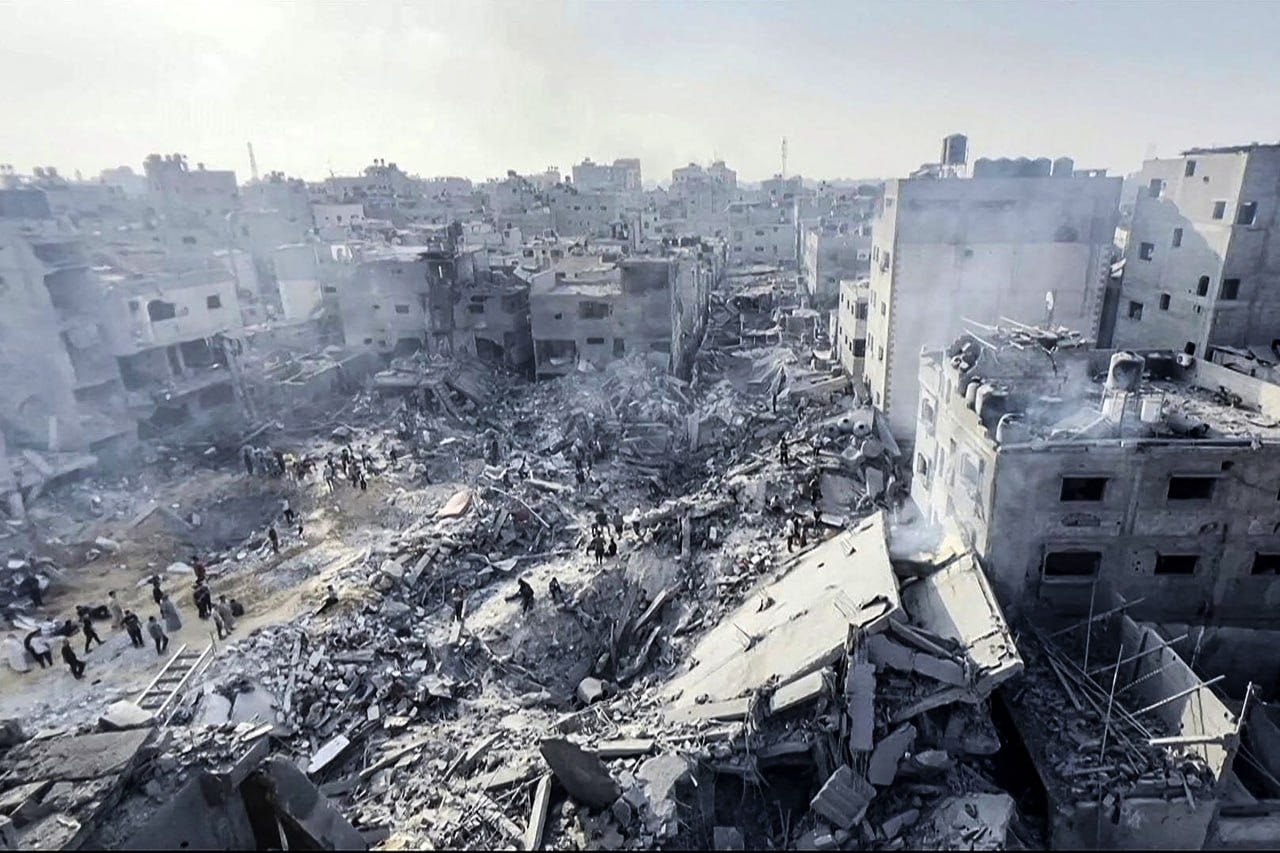Unraveling the Threads of War

Sumer, Mesopotamia, circa 2300 B.C.E.
Lament to The Spirit of War - Enheduanna
You hack everything down in battle. . . . God of War, with your fierce wings you slice away the land and charge disguised as a raging storm, growl as a roaring hurricane, yell like a tempest yells, thunder, rage, roar, and drum, expel evil winds! Your feet are filled with anxiety! On your lyre of moans I hear your loud dirge scream. Like a fiery monster you fill the land with poison. As thunder you growl over the earth, trees and bushes collapse before you. You are blood rushing down a mountain, Spirit of hate, greed and anger, dominator of heaven and earth! Your fire wafts over our land, riding on a beast, with indomitable commands, you decide all fate. You triumph over all our rites. Who can explain why you go on so?
“Enheduanna (circa 2300 B.C.E.), a Sumerian poet/priestess, is the first known poet, man or woman, of prehistory. She can also be thought of as one of the earliest known war protesters in history.” - Women on War: An international Anthology of Writings From Antiquity to Present, Daniela Gioseffi
Arras, France, Summer 1435
Though it has been 15 years since the duke of Burgundy’s brutal assassination upon that fateful bridge at Montereau, the force of his loss is still felt and grieved by those who loved him, those who served him, and those who feared him. As a knight within the Burgundian army long allied with the English, loss and brutality are common experiences and a good fellow to us each. Death, actually, is all around us.1
The brutality has only increased as the Armagnac's employ a campaign of terror and the war of attrition drags on as one great lord asserts his dominance over another, each believing in his own divine superiority. We once felt so steadfast in our endeavor, ordained by God to punish the murderers of our fearless duke. Yet the surety is slipping further each day. Men’s corpses scatter the dusty road to Paris, devoured by wolves suffering the same famine as the people within the city walls. The scorched earth policy of our allies has left both citizen and solider starving; the crops sizzling in the summer rain, extinguishing the last hope of fall victuals.
But this is a new dread we now feel. Our enemies are our allies once again while a by-law brother dishonors our good duke Phillip and will soon learn of our move against him. I am not alone housing this sense of foreboding and abashment. The English regent will surely strike down upon us, brandishing his chivalry as a shield, duty bound to a dead king’s wishes. Are we to revenge our fearless duke John, or are we to join our fellow liege-men to protect French chattels and the interests of an ordained Charles? Signed treaties thrown to the wayside in favor of personal wealth and ambition while we abandon the sacrifices of two generations of men. What weight does an oath carry when a great lord can neglect his word while the common man is punished for far less?
‘Between ourselves, we have been very badly advised to risk and put in peril our bodies and when it please them, are reconciled to each other, while… we are left impoverished and ruined.’ - Unnamed Burgundian knight, 1435

Rochester, New York, 1911
Patriotism as a “Menace to Liberty” - Emma Goldman
“What is patriotism? Is it love of one’s birthplace, the place of childhood’s recollections and hopes, dreams and aspirations? Is it the place where, in childlike naivete, we would watch the floating clouds and wonder why we, too, could not run so swiftly? In short, is it love for the spot, every inch representing dear and precious recollections of a happy, joyous, and playful childhood?
If that were patriotism, few American men of today would be called upon to be patriotic, since the place of play has been turned into factory, mill, and mine, while deepening sounds of machinery have replaced the music of the birds. No longer can we hear the tales of great deeds, for the stories our mothers tell today are but those of sorrow, tears, and grief.
What, then, is patriotism? “Patriotism, sir, is the last resort of scoundrels,” said Dr. Johnson. Leo Tolstoy, the greatest anti-patriot of our time, defines patriotism as the principle that will justify the training of wholesale murderers.
Indeed, conceit, arrogance, and egotism are the essentials of patriotism. Let me illustrate. Patriotism assumes that our globe is divided into little spots, each one surrounded by an iron gate. Those who have had the fortune of being born on some particular spot consider themselves nobler, better, grander, more intelligent than those living beings inhabiting any other spot. It is, therefore, the duty of everyone living on that chosen spot to fight, kill, and die in the attempt to impose his superiority upon all the others.
Thinking men and women the world over are beginning to realize that patriotism is too narrow and limited a conception to meet the necessities of our time. The centralization of power has brought into being an international feeling of solidarity among the oppressed nations of the world; a solidarity which represents a greater harmony of interests between the working man of America and his brothers abroad than between the American miner and his exploiting compatriot; a solidarity which fears not foreign invasion, because it is bringing all the workers to the point when they will say to their masters, “Go and do your own killing. We have done it long enough for you.”2
The Internet, Florida, Winter 2023
Forgive my poor attempt at crafting a dreary (and anachronistic!) scene of France in the 1400s, but I felt it important to set the stage for the final quote from an unnamed 15th century Burgundian knight which tugs on the thread of war that connects us to the medieval: The everyman dies satiating the patriarch’s prerogative. Those who sit in the war rooms sacrifice the lives of people whose names they don’t care to know; corpses among the dust. The colorful tapestries of family trees unraveled within a single moment while propagandized content reverberates through the social networks. PATRIOTISM, PATRIOTISM, PATRIOTISM.
The Hundred Years’ war between France and England changed the landscape of 15th century Europe. What started as a grab for power from two separate parties resulted in a civil war and an aggressive invasion. England watched as France caved in upon itself and Henry V, the ultimate patriarch, did what patriarchs do best: exploited a weakness for personal gain. And much like today, war in the 15th century was a profitable endeavor for those who knew how to weave the narratives. War allowed the everyman access to wealth that was usually reserved for the privileged few. Greed masked as patriotism, a familiar theme to the modern reader.
A soldier’s income in the 1400s was meager (especially in relation to potential harm) and often unreliable. The English crown had spent well beyond it’s means which consequently emboldened, and even encouraged, atrocious behaviors and tactics on the ground. Entire communities were leveled in the name of pillaging and plundering to compensate for lost income. Burned crops, slaughtered or stolen cattle, rape, and the kidnapping and ransoming of citizens were everyday occurrences. These acts igniting further the fervor of patriotism by those forced to defend their very livelihoods from countryman and invader alike (such as Jehanne d’Arc.) The war left few untouched by trauma.
As we progress beyond the medieval and into the modern, we are met with incremental initiatives meant to curb human suffering in wars unilaterally declared as inevitable by the powers that be. In 1917 the Geneva Convention forbade the continuation of scorched earth policies that were a cornerstone of both French and Anglo-Burgundian tactics during the Hundred Years War. Though the idea of an international convention dictating the rules of war is relatively new, codifying discipline in efforts to enforce humanity far predates the Hague3 Regulations. The English regent of France, John duke of Bedford, spent the years prior to his death in 1435 issuing regulations to ensure the behavior of England’s allies didn’t spur the local populace into full rebellion. He felt it imperative they didn’t unintentionally create yet another enemy.
Azincourt was 608 years ago, yet a Hundred Years’ War still wages on today. Western media and the ever-churning American propaganda machine would have us believe these hostilities are a full-fledged war, but to refer to the Palestine/Israel conflict as such is disingenuous and misleading to the extreme. Which of course is the point. One side is a world super power, funneling in war funds by the billions from it’s wealthy allies to support a conscripted army, while the other side are occupied civilians without a standing military. I want to be clear, loss of life is devastating on both sides of this atrocious aisle, but inflicting pain as a reaction to pain inflicted is the most unhealed shit I’ve heard of; reminiscent of the school yard bully picking on the much younger, smaller kid.
As I type this, 25,000 tons of explosives have been dropped upon the open air prison that is the Gaza Strip. The largest news outlets in the world reporting on the inevitability of this conflict while subliminally stoking islamophobia and the conflation of Muslim ≈ terrorist. Israel’s far-right PM, Netanyahu and his government, have repetitively utilized language that human right’s organization’s call out as “invitations to commit war crimes.” Yet by the Geneva outlines, war crimes have been committed. Israel actively withholds access to food, water, electricity, internet, and medicine from the Palestinian people; taking a book out of Bedford’s scorched earth policies to the backdrop of a modern aesthetic.
“From October 7 to 25, at least 7,028 people - including 2,913 children - have been killed in Israeli attacks on Gaza, according to the Palestinian Ministry of Health.” - Al Jazeera
We are fed that these atrocious acts are inevitable outcomes, but only within a patriarchal structure would war be seen as inevitable. War is a symptom of a system that promotes hierarchical structures, xenophobia, and isolation. War is a symptom of a system that encourages compartmentalization and suppression of emotions. War is the outcome of hyper-patriotism and valuing land over people. We will never shed the shackles of war while we continue to operate within oppressive patriarchal systems worldwide. Too often we are asked how to solve the war question by those unwilling to acknowledge and investigate the socio-political systems they are actively wrapped up in. But the answer is simple: smash the patriarchy and uplift the matriarchy.
Further Reading
The Penguin Book of First World War Poetry, Jon Silken
“Even compassion must now be circumspect, for if it doesn’t try to do away with, or limit, the war that causes the suffering, it’s indulgent. At best compassion like this walks behind the system.
Our humanity must never be outwitted by systems, and this is why we are at our most vital when our intelligence is in full and active cooperation with feeling. We shall never not be political again, and the best way to be this, among other things, is to think and feel; and if this cooperative impulsion is permeated with values we can decently share, we stand a chance, as a species, of surviving, for that, I think, is what is at stake.”
I had to, I’m sorry.
Women on War: An international Anthology of Writings From Antiquity to Present, Daniela Gioseffi - Do go read the entire piece, it is powerful.
HOEG? HOEG? I’m sorry for that. For all of them.













